History finals Second semester
What is Imperialism?
◦Began circa 1875.
◦A renewed race for colonies.
◦Mainly economic - about the possession or control of an area for economic gain.
◦Involved spheres of influence and extraterritoriality instead of colonial settlement or direct control.
◦Colonies represented economic and political power.
How was Imperialism different from earlier Colonialism?
◦Earlier Colonialism often involved setting up colonies and exercising direct control (as inferred from the comparison in the source).
◦Imperialism was no longer about setting up colonies or exercising direct control over areas.
◦Imperialism was mostly economic.
1/72
Earn XP
Name | Mastery | Learn | Test | Matching | Spaced |
|---|
No study sessions yet.
73 Terms
What is Imperialism?
◦Began circa 1875.
◦A renewed race for colonies.
◦Mainly economic - about the possession or control of an area for economic gain.
◦Involved spheres of influence and extraterritoriality instead of colonial settlement or direct control.
◦Colonies represented economic and political power.
How was Imperialism different from earlier Colonialism?
◦Earlier Colonialism often involved setting up colonies and exercising direct control (as inferred from the comparison in the source).
◦Imperialism was no longer about setting up colonies or exercising direct control over areas.
◦Imperialism was mostly economic.
What spurred Imperialism?
◦Needs created by the Industrial Revolution.
◦Need for new markets for finished goods.
◦Need for new sources of raw materials.
◦Nationalism.
What were the Economic Motives for Imperialism?
◦Finding Markets for finished goods (like British products in China and India).
◦Acquiring Sources of raw materials (such as cotton from Egypt, rubber and tin from Malaya, oil from the Middle East).
◦Making Capital investments (investing profits from the Industrial Revolution into things like mines and railroads in unindustrialized areas).
What were the Political Motives for Imperialism?
◦Nationalism or national pride.
◦Large empires increased national pride (related to ideas like "The sun never sets on the British empire").
◦Gaining influence over areas of the world to protect national interests.
Old Regime
Socio-political system which existed in most of Europe during the 18th century.
Absolutism
Countries were ruled by Absolutism - the monarch had absolute control over the government.
Divine Right
Monarch ruled by divine right - God put the world in motion, God put some people in positions of power, power is given by God.
No one can question God or someone put in power by God.
Questioning the monarchy was blasphemy because it meant questioning God.
Deficit Spending
A government spending more money than it takes in tax revenues.
France under Louis XVI experienced deficit spending due to lavish spending, costly wars like the American Revolution, and the privileged classes not being taxed.
Philosophes
Philosophers during the Enlightenment who began to ask if natural laws might also apply to human beings, particularly to human institutions such as governments.
They were secular in thinking and used reason and logic to determine how governments are formed.
They also questioned the divine right of kings.
Emigres
Nobles who fled France during the upheaval of the French Revolution.
They lived abroad and hoped that, with foreign help, the Old Regime could be restored in France.
Many nobles left France and became known as émigrés under the National Assembly as well.
Limited Monarchy
A form of government in which the monarch's power is limited by a constitution or a legislative body.
France became a limited monarchy with the Constitution of 1791, where the king became merely the head of state and all laws were created by the Legislative Assembly.
Republic
A government in which the people elect representatives who will create laws and rule on their behalf.
The First French Republic was established by the Convention on September 22, 1792.
Girondists
Moderates who represented the rich middle class of the provinces during the Convention.
Jacobins
Represented workers and were led by Marat, Danton, and Robespierre during the Convention.
Danton and his Jacobin political party came to dominate French politics during the Reign of Terror.
Committee of Public Safety
Headed by Danton (and later Robespierre) during the Reign of Terror.
Those accused of treason were tried by the Committee’s Revolutionary Tribunal.
What were the 3 Estates, and which were considered privileged?
In France, people were divided into three estates:
First Estate (high-ranking members of the Church)
Second Estate (Nobility)
Third Estate (everyone else from peasants to wealthy bourgeoisie).
The First and Second Estates were considered privileged.
Legislative Assembly
The new government in France established by the Constitution of 1791.
It created all the laws, but voting was limited to taxpayers and offices were reserved for property owners.
Who bore the Tax burden in France during this time period?
Unprivileged people paid taxes and were treated badly.
Peasant farmers of France bore the burden of taxation.
The bourgeoisie also paid taxes but were upset that nobles did not.
Bourgeoisie
Middle Class
Why was France Bankrupt?
The king (Louis XVI) lavished money on himself and residences like Versailles.
Queen Marie Antoinette was seen as a wasteful spender.
The government found its funds depleted as a result of wars, including the funding of the American Revolution.
There was deficit spending.
Privileged classes would not submit to being taxed.
How did the enlightenment influence the French Revolution?
Philosophes questioned the divine right of kings.
They began to ask if natural laws might also apply to human institutions such as governments.
The influence of Enlightenment philosophes was a long-term cause of the French Revolution.
What were the long-term causes of the French Revolution?
Absolutism
unjust socio-political system (Old Regime)
poor harvests
influence of Enlightenment philosophes
system of mercantilism
and the influence of other successful revolutions like the American Revolution.
Mercantilism
A system of mercantilism which restricted trade was one of the long-term causes of the French Revolution.
Commune
The Parisian city government that the people of Paris organized after seizing weapons from the Bastille.
In the uproar against the new government, the Commune took control of Paris.
Explain the problem during the Estate-General resulting in the Tennis court oath.
Voting in the Estates-General was conducted by estate, with each estate having one vote.
The First and Second Estates could operate as a bloc to stop the Third Estate from having its way.
Representatives from the Third Estate demanded that voting be by population.
When they were locked out of the meeting, the Third Estate declared itself the National Assembly and took the Tennis Court Oath, vowing to create a written constitution.
What was the Storming of the Bastille and why did it happen?
On July 14, 1789, people of Paris seized weapons from the Bastille. This was an uprising in Paris.
Key features of the Declaration of the Rights of Man
Freedom of religion
freedom of speech
freedom of the press
guaranteed property rights
"Liberty, equality, fraternity!"
right of the people to create laws
right to a fair trial.
How would the French Revolution have affected the Clergy?
Abolition of special privileges. Church lands were seized, divided, and sold to peasants.
The Civil Constitution of the Clergy required that Church officials be elected by the people, with salaries paid by the government. Many fled the country rather than swear allegiance to this.
How would the French Revolution have affected the Nobles?
Abolition of special privileges.
Nobles were attacked, and records of feudal dues were destroyed. Many fled the country as émigrés.
How would the French Revolution have affected the Peasant Farmers?
Feudal dues and tithes were eradicated. Church lands were seized and sold, potentially benefiting some peasants.
They were part of the Third Estate which saw significant changes in rights and privileges.
Taxes were to be levied based on the ability to pay.
How would the French Revolution have affected the Royal Family?
The royal family's power was significantly reduced under the Limited Monarchy.
They were eventually arrested while trying to flee.
The monarchy was abolished, and Louis XVI and Marie Antoinette were guillotined.
What did the rest of Europe think of the French Revolution?
European monarchs feared that the revolution would spread.
Austria and Prussia invaded France.
A Coalition of European powers, including Austria, England, Holland, Prussia, Sardinia, and Spain, formed to oppose France.
What was the Reign of Terror?
A period from September 5, 1793, to July 27, 1794, when the Jacobin political party, particularly through the Committee of Public Safety, dominated French politics. Approximately 15,000 people died on the guillotine.
Factions
Small groups that competed to control the city of Paris during the uprising.
Fillippo Brunelleschi (1377-1446)
-commissioned by the Medicis to create a church in Florence
(II Dumo Cathedral)
-studied the parthenon in Rome & used a robed design to internally support the dome of cathedral
Donatello
-1386-1466
-known for his use of 3 dimensions expressions & realism in his sculptures
-bronze sculpture of David
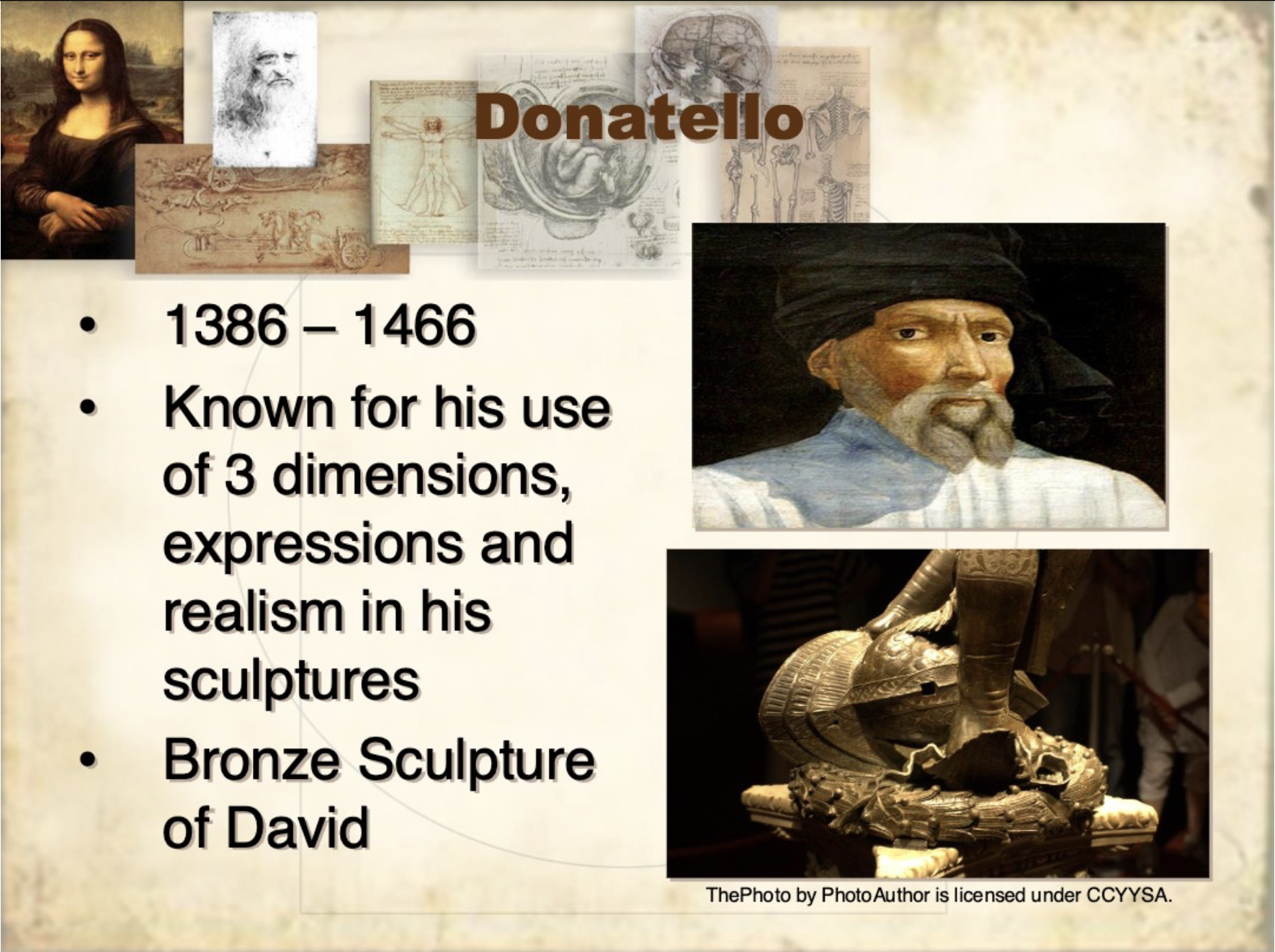
Leonardo de Vinci
-1452-1519
Only 17 painting:
-moona lisa
-last supper
-madonna of the rocks
Notebooks:
-drawing of the unfinished works
-used science to support art
-coded & read K-L with a mirror
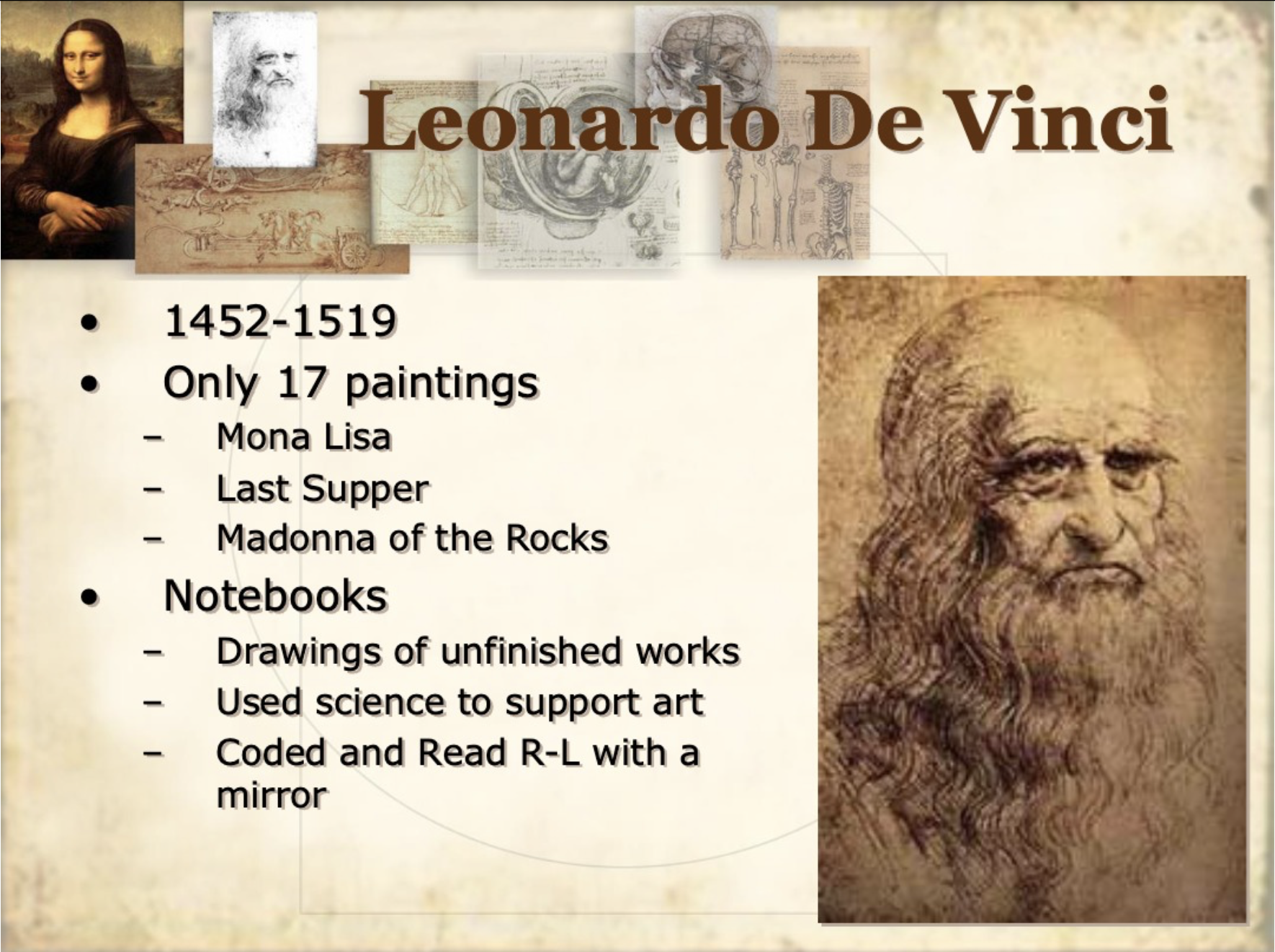
Michaelangelo
-1475-164
Sculptures:
-pieta
-david
Painting:
-sistine chapel
-architecture
-poet
Raphael
-1483-1520
-studied the works of Michelangelo & da vinci
-chosen as an architect for st. Peters basilica & the school of Athens which included himself Michelangelo w/ socrates & plato
Niccolo Machiavelli
-1469-1527
-florence
The Prince:
-less concerned about high ideals
-written from a secular standpoint
-how to get power & hold on to that power
-appearances are sometimes more important than actuality
-”machiavellian politics”
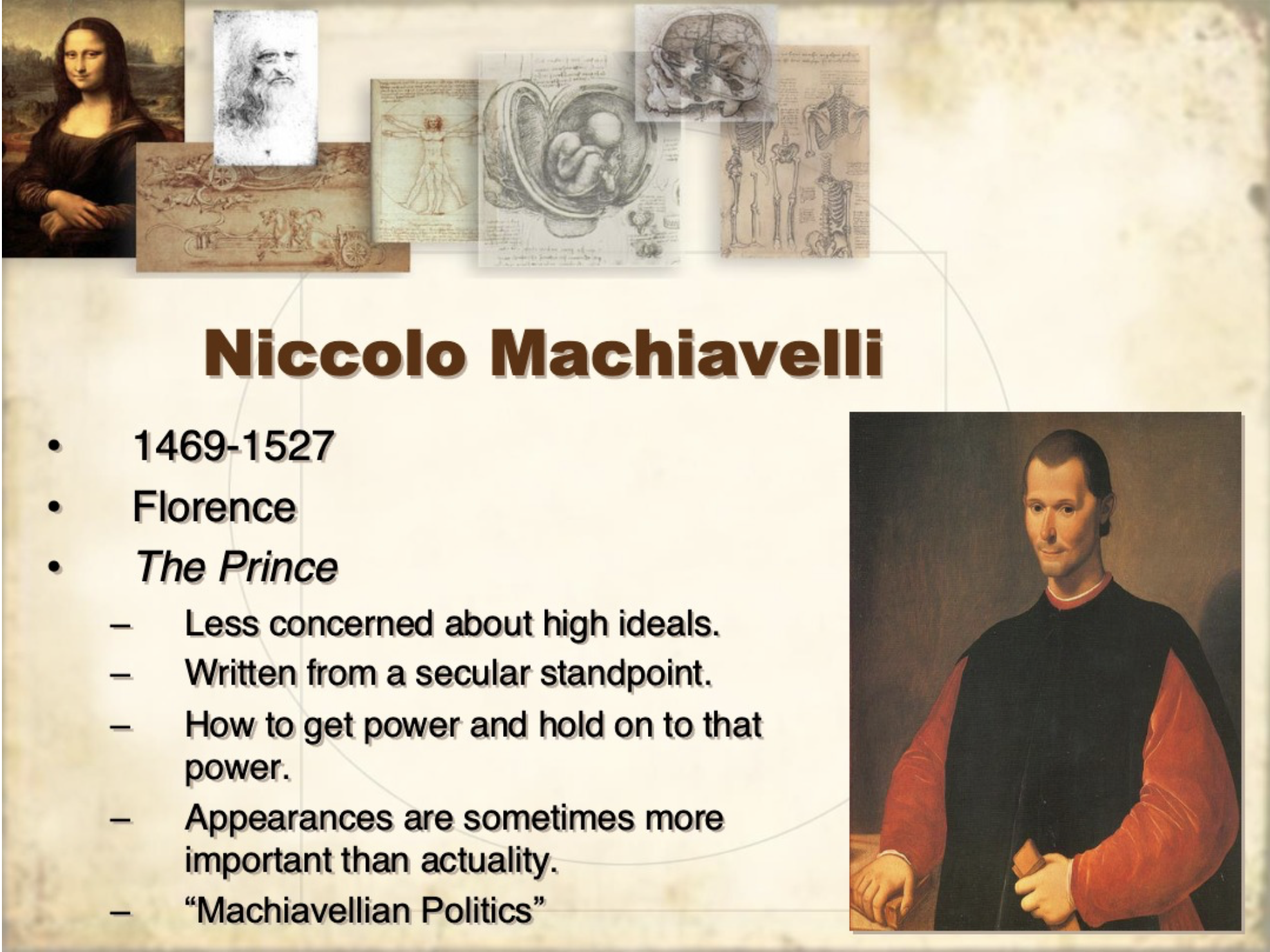
Sir Thomas Moore
-1479-1535
-English humanist
Otopia:
-an ideal society where everyone’s needs are met
-elimination of private property
-everyone’s work is equal & educated
-justice is used to exit crime
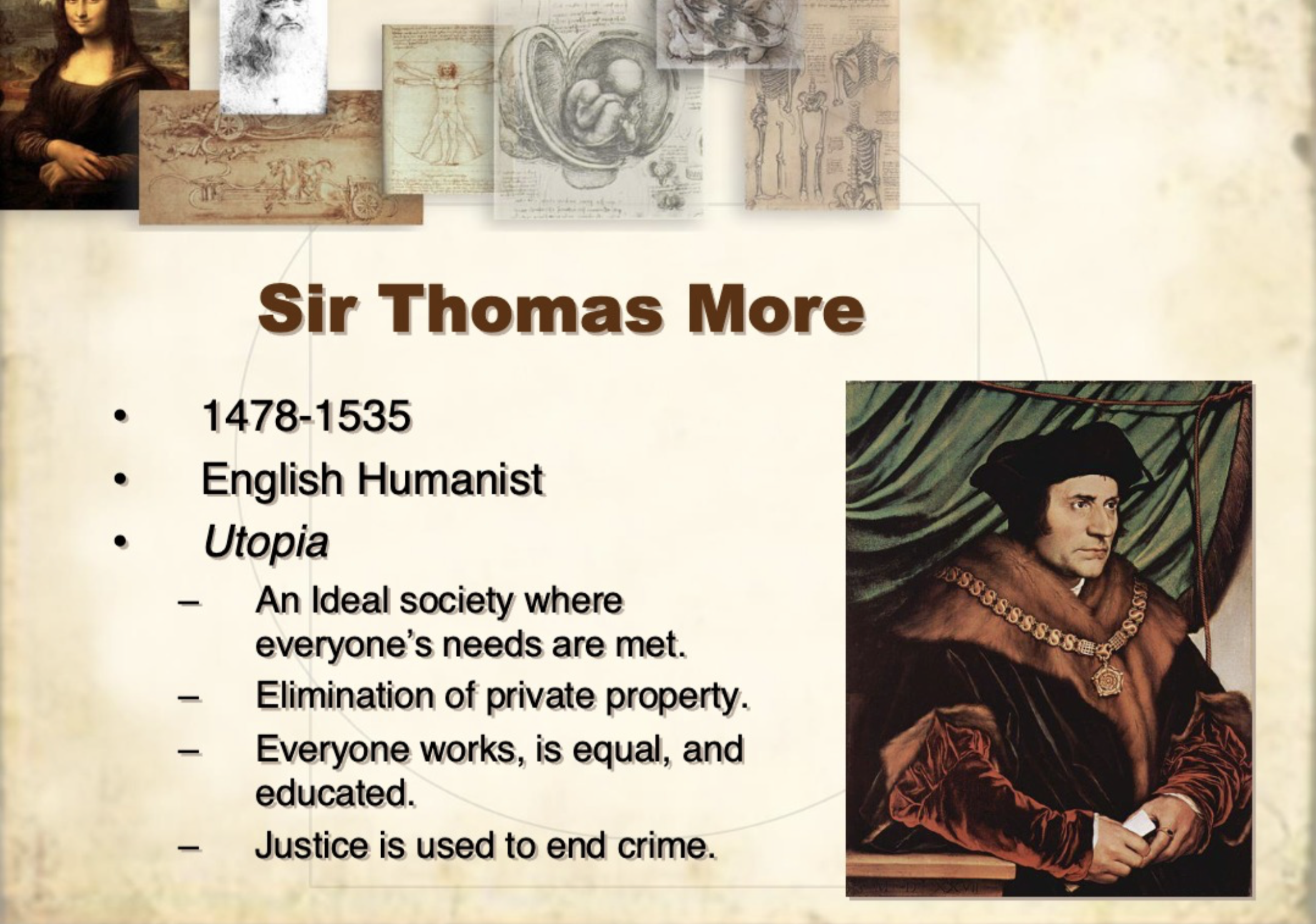
William Shakespeare (1564-1616)
-the most famous writer of this time period
-37 plays
-tragedies
Hamlet, Romeo & Juliet, McBeth:
-history
Julius Caesar, Richard III
-added 1000’s of words to the English language
-poems
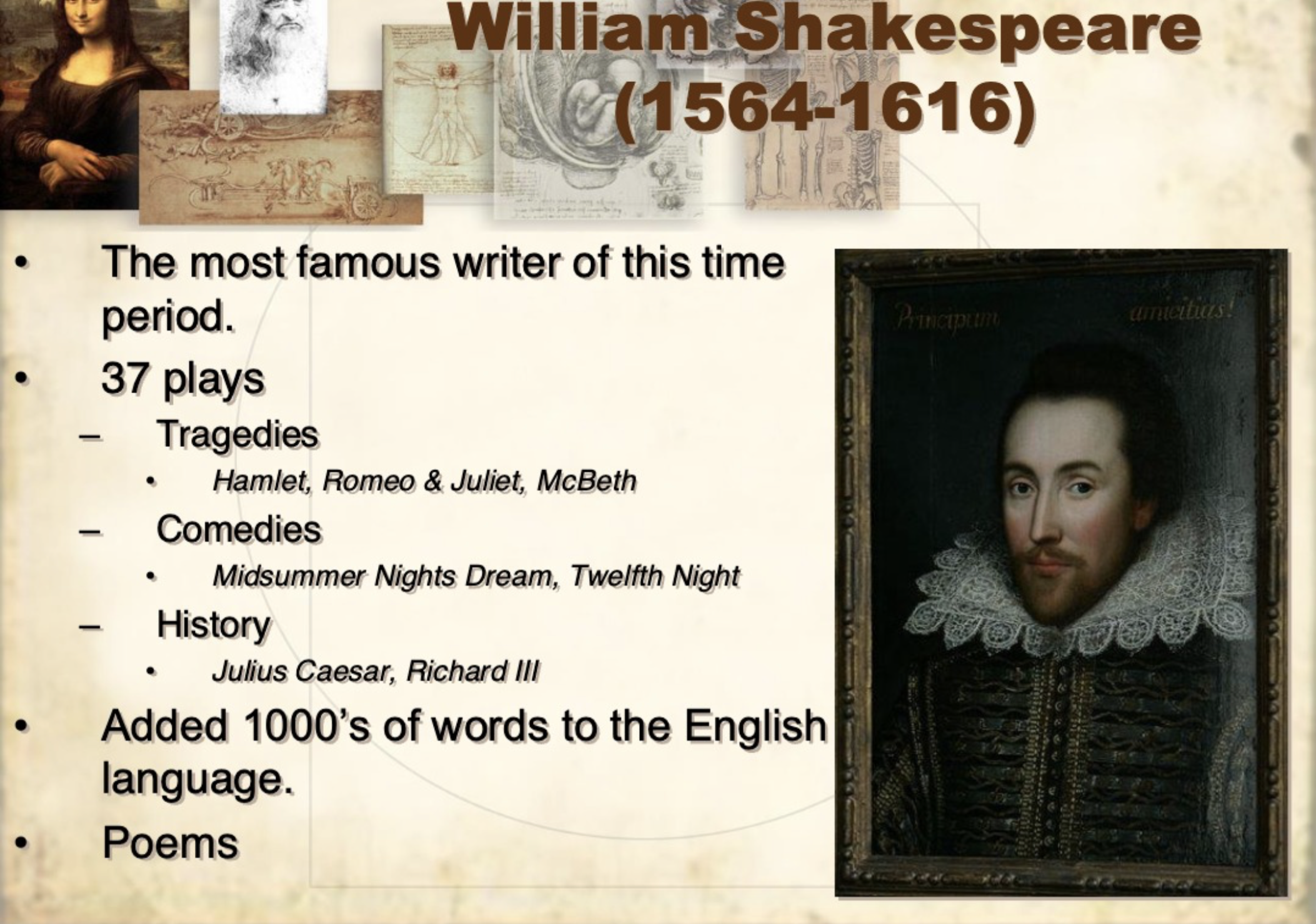
Miguel de Cervantes
-1547-1616
Don Quixote
-a foolish but idealistic knight
-mocked the romantic notions of chivalry
Erasmus
-1466-1636
-dutch humanist
-attacked corruption in the church using satire (the praise of folly)
-pushed for translations of the Bible into everyday venacular
Where it all began
-Italy
Why Italy?
-nostalgia for Ancient Rome
-the new availability of Ancient Greek & roman writings
-italian merchants had money because of increase of trade from the crusades
Early Middle Ages
476 - 1000 AD
High Middle Ages
1000 - 1250 AD
Late Middle Ages
1250 - 1450 AD
Chilvary
Code of conduct for knights
Charter
A written document that set out the rights & privileges of a town
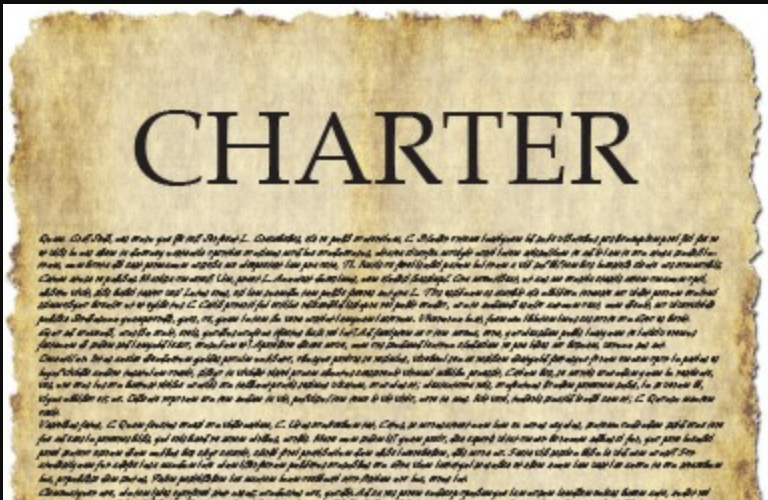
The Franks
The Frankish kingdom expanded from Clovis to Charlemagne[2]. It stretched from present-day Spain up to Germany and south into Italy [2]. Capitals included Aachen and Rome [2]
![<p>The <span style="color: rgb(203, 159, 235)">Frankish kingdom</span> expanded from <span style="color: rgb(202, 74, 232)"><strong>Clovis to Charlemagne</strong></span>[2]. It stretched from present-day <span style="color: rgb(183, 122, 210)"><strong>Spain up to Germany and south into Italy</strong></span> [2]. Capitals included <span style="color: rgb(211, 91, 219)"><strong>Aachen and Rome</strong></span> [2]</p>](https://knowt-user-attachments.s3.amazonaws.com/4c20377f-4829-4e55-9d6b-d24a0aa1078b.png)
Clovis
Developed the Franks into one of the strongest of the Germanic tribes in Europe.[2]
Baptized in 481 A.D.[2]
![<p><span style="color: #b38bff">Developed the Franks into one of the strongest of the Germanic tribes in Europe</span>.[2] </p><p><span style="color: #d8a1f0">Baptized in 481 A.D.</span>[2]</p>](https://knowt-user-attachments.s3.amazonaws.com/70f94b83-0a53-49ae-bda0-da280c7f50ef.png)
Battle of Tours
Franks (Charles Martel) vs. Islamic Moors (Abdul Rahman Al Ghafiqi)
Martel chose ground that would neutralize the
Islamic cavalry.
Stopped the advance of
Islam into Europe.
Tours, France
Charlemagne
Charles the Great
747-814 A.D.
Reigned for 46 years
Grandson of Charles
Martel.
800 A.D. he was crowned Emperor of the Holy Roman Empire by Pope Leo
III. (political move)
Charles Martel
Leader of the Franks in the Battle of Tours: he chose ground that would neutralize the islamic calvary/stopped the influence of Islam in Europe.
Carolingian Renaissance
Emphasis on art and education, especially of a religious nature [3].
Invention of lowercase letters (did not exist in Latin) [3].
Missi Domenici were officials who would check on roads, listen to complaints, and ensure justice [3].
Preserved ancient Greco-Roman culture
Treaty of Verdun (843 A.D.)
Divided Charlemagne's empire into 3 parts:
West Frankish Kingdom - France [4]
East Frankish Kingdom - Germany [4]
Reasons for the break-up of Charlemagne’s Empire
Lack of an effective tax system [5].
Poor means of communication made it difficult to enforce laws [5].
The German tradition of dividing land between sons[5].
Attacks from Vikings, Magyars, and Muslims [5]
Feudalism
A loosely organized system of rule in which powerful lords divided their large landholdings among lesser lords [6].
Vassals were lesser lords [6].
Fief was an estate given to a vassal from a lord [6].
A lord could BE a vassal and HAVE vassals!!!! [6].
![<p><span>A loosely organized system of rule in which </span><span style="color: #d59cf9"><strong>powerful lords</strong></span><strong> </strong><span style="color: #d697fa"><strong>divided their large landholdings among lesser lords</strong></span><span> [6].</span></p><p><span style="color: #ad5eda"><strong>Vassals</strong></span><span> were lesser lords [6]. </span></p><p><span style="color: #a576d7"><strong>Fief</strong></span><span> was an estate given to a vassal from a lord [6].</span></p><p><span style="color: #b97dff">A lord could BE a vassal and HAVE vassals!!!!</span><span> [6].</span></p>](https://knowt-user-attachments.s3.amazonaws.com/8f617cfd-595c-487e-845d-ba774b306be3.png)
What was the agricultural revolution?
Period 1700s- 1800s during which machines and improved technology replaced manual labor/ traditional methods in farm
Revival in Trade
-increase populations so high need for goods
- merchants travel around Europe to sell goods in trade fairs
- regular trade routes were established
- peasants exchanged goods for crafts/ other goods not offer in manor
- Noblemen/ clergy bought luxury items life silk, sugar, fire
Give & Take of Feudalism: Lords
Agreed to protect vassals and serfs and provide a court system.
Give & Take of Feudalism: Vassals
Agreed to provide military service, pay taxes, give shelter, entertainment, and food [7].
Medieval Social Hierarchy
King and lords were considered nobles [8].
Peasants, or serfs, worked the land and had little interaction with their lords [8].
Movement up or down between classes was almost non-existent [8].
how did towns develop?
-Fairs closed in autumn when roads were impassable
- merchants spent winters near castles/ bishop places
- Their centers of trade develop in medieval cities
What was the influence of guilds on towns?
- passed laws, levied taxes, and decided on what to spend
(over time diff trades developed their own guilds/ limited the amount of workers in their trade)
Knights
Mounted Warriors.
Knights usually started out as a Page and than moved up to a Squire before becoming a Knight.
Feudal Lords battled constantly but as warfare died down knights began to compete in tournaments.
Observed a strict code of Chivalry.
Manor System
An agricultural system based on self-contained estates called manors [9].
Serfs (peasants) worked the land for a Lord [9].
Serfs were not slaves but could not leave the Manor [9].
Serfs lived in one-room huts, often with their animals [9].
Serf's Daily Life
Day began before sunrise with hard labor in the fields
[10].
Worked from dawn until dusk [10, 11].
Took a short break to eat a simple meal, such as bread and stew [10].
Returned to small, simple cottages [11].
Tended to animals, ate a simple dinner, and mended clothes or tools [10].
Serf Family Roles
Women also worked in the fields, took care of children, cooked, and made clothing [12].
Children helped their parents with farming and household chores [12].
Lord/Lady's Daily Life
Day started with a large breakfast [10].
Lords might train for battle, hunt, or settle disputes [10].
Ladies spent time managing servants and planning meals [10].
Lived in large manor houses [13].
The day often ended with a feast [10].
Noble Children
Educated by tutors, learning manners, religion, and sometimes combat skills [14].
Boys trained as knights, while girls prepared for marriage and household management [14].